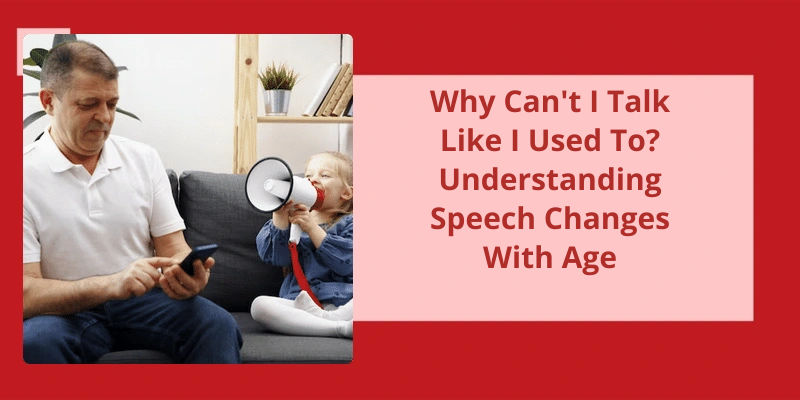As human beings, communication is one of our most fundamental tools for expressing ourselves and connecting with others. However, at times we may experience difficulties with our ability to communicate effectively, be it through speech, writing, or other forms of expression. In particular, some people might find that they can't talk like they used to, perhaps due to a medical condition, a traumatic event, or simply because of the natural changes that occur as we age. This loss of fluency and confidence can be frustrating, isolating, and impact both our personal and professional lives in profound ways. So, why can't we talk like we used to, and what can we do to regain our voice? This is a complex question that requires us to consider various factors, such as the physical, psychological, and social aspects of communication, as well as the individual circumstances that might be affecting our ability to speak with ease and clarity.
Why Can’t I Hold a Conversation Anymore?
Another reason why you may not be able to hold a conversation could be due to depression or a lack of interest in the topic. If you’re going through a tough time, it can be challenging to focus on anything else. Your mind may wander or you may feel exhausted and unable to participate in a conversation. Alternatively, if the topic isnt particularly engaging or relevant to you, it can be difficult to remain invested or to think of meaningful responses.
Furthermore, technology and social media might also be impacting your ability to hold a conversation. With the rise of smartphones, many people find themselves constantly checking their notifications and social media feeds instead of actively participating in conversations. This can lead to a decrease in face-to-face communication skills and an over-reliance on online communication, which is often less personal and lacks non-verbal cues.
Another factor to consider is the impact of multitasking on your conversation skills. Many people try to juggle multiple tasks at once, which can result in a decreased ability to focus on the conversation at hand. This can lead to a lack of engagement, difficulty with staying on topic, and ultimately, difficulty with holding a conversation.
Finally, it’s important to consider that the current global pandemic may be impacting your ability to hold a conversation. With social distancing and working from home becoming the norm, people are finding themselves with less face-to-face social interaction. This can lead to a decrease in practice and confidence in ones conversation skills, making it feel more difficult to hold a conversation when given the opportunity.
It could be related to social anxiety, depression, lack of interest, technology, multitasking, or even societal changes like social distancing. By identifying the root cause of the issue, one can begin to work towards improving their conversation skills and ultimately feel more confident and comfortable when engaging in social situations.
It’s not uncommon to feel hesitant or nervous when it comes to speaking up, but for some individuals, this feeling can be much more intense. Social anxiety, a condition characterized by intense fear and self-consciousness in social situations, can often be the root cause of this hesitancy. In addition to the fear of judgment, anxiety can also affect the ability to put thoughts and words together, making it challenging to communicate effectively. In this article, we’ll explore why some individuals struggle with speaking and offer tips on how to overcome this anxiety.
Why Do I Feel Hesitant to Speak?
Other factors that can contribute to hesitancy in speaking include past negative experiences, low self-esteem, and a lack of confidence in ones communication skills. For example, if someone was bullied or criticized for speaking in the past, they may develop a fear of speaking that continues into adulthood. Additionally, those who struggle with self-esteem or confidence may feel like they’ve nothing valuable to contribute to a conversation, leading them to stay quiet and avoid speaking up.
Furthermore, social anxiety disorder can have a significant impact on an individuals communication abilities. Social anxiety can cause excessive self-consciousness and fear of negative evaluation, making it difficult to engage in social situations. For those with social anxiety, being around others can feel overwhelming, leading them to avoid interactions or become overly preoccupied with how they’re coming across to others. This hyper-vigilance can lead to self-doubt and rumination, making it harder to think clearly, articulate thoughts, and communicate effectively.
Cognitive behavioral therapy (CBT), for example, can be an effective form of treatment for social anxiety disorder. CBT helps individuals identify and challenge negative thought patterns, change behaviors, and develop coping skills for managing anxiety symptoms. Additionally, practicing mindfulness and relaxation techniques, such as deep breathing or progressive muscle relaxation, can help individuals feel more calm and centered, making it easier to communicate with others.
It can also be helpful to practice speaking in low-stakes situations, like with friends or family members, before working up to more challenging social situations. Additionally, seeking out a supportive community can help individuals feel more comfortable speaking up. Joining a support group or taking part in a social activity, like a club or hobby group, can help individuals build social connections and develop their communication skills in a safe and supportive environment.
Overall, feeling hesitant to speak can be a symptom of social anxiety or other underlying mental health issues. However, with the right treatment and support, individuals can learn to overcome this hesitancy and develop stronger communication skills. By challenging negative self-talk, practicing relaxation techniques, and seeking out supportive social environments, individuals can learn to speak with confidence and ease.
If you find yourself struggling to keep a conversation going, you’re not alone. Many people experience social anxiety and social awkwardness, which can hinder their ability to engage in meaningful conversations. In this article, we’ll explore some of the reasons why you might struggle to keep a conversation going and offer some tips on how to overcome these obstacles.
Why Do I Struggle to Keep a Conversation Going?
These are often the primary drivers behind why we struggle to keep a conversation going. When the anxiety or awkwardness is too much, you may feel like you cant form a coherent thought or string together sentences in a meaningful way. It’s like your brain goes into fight-or-flight mode, and you struggle to stay present and engaged.
Another big reason why some people struggle to keep a conversation going is that they simply don’t have enough practice. Building social skills takes time and effort, and it’s not something that comes naturally to everyone. If you didnt have many opportunities to practice socializing with others growing up, or if youve spent a lot of time alone in recent years, it’s understandable that you might feel uncomfortable in social situations.
Of course, there are also certain personality types that are more prone to struggling with conversation. For example, introverts might find it more draining to keep a conversation going because they need time to recharge their batteries. On the other hand, people with very strong personalities may struggle to listen to others because they’re always desperate to have their own voice heard.
Ultimately, part of the key to keeping a conversation going is being able to assess the other persons needs and tailor your approach accordingly. This can be challenging, especially if youre dealing with someone who’s vastly different communication preferences than you. But with practice, patience, and a willingness to learn, you can start to feel more confident in your conversational abilities.
Finally, it’s worth noting that sometimes, we just don’t connect with the people were talking to. Whether it’s because of a lack of shared interests, mismatched personalities, or any number of other factors, it’s okay if not every conversation feels like a winner. Dont beat yourself up too much if you struggle to keep a conversation going from time to time – just keep working at it, and remember that practice makes perfect.
How to Navigate Awkward Silences and Lulls in Conversation
- Ask a question to get the conversation going again
- Comment on something in your surroundings
- Talk about a shared interest or hobby
- Share an interesting story or anecdote
- Use humor to break the tension
- Ask for their opinion on a topic
- Suggest a new topic to discuss
- Take a moment to reflect on the silence and appreciate the company
Source: Why is it hard for most people to keep a conversation going?..
It’s a common problem that many of us face – running out of things to talk about. But have you ever stopped to consider why that might be? It turns out that we often filter our conversations, subconsciously trying to present ourselves in the best light possible. This leads to a lot of pressure to choose the “right” things to talk about, and can ultimately leave us with nothing to say at all.
Why Do I Keep Running Out of Things to Talk About?
Communication is an essential aspect of our daily lives, and we all have experienced moments when we struggle to come up with things to say. It can be frustrating and make us feel inadequate. One of the reasons why we run out of things to talk about is that we filter too much. We try to present ourselves in the best possible light, so we carefully choose what topics we discuss. Unfortunately, this approach can backfire as we end up rejecting potential conversation topics that could have been interesting.
Furthermore, we also tend to overthink our conversations, creating an additional layer of pressure that adds to the struggle of finding things to say. We worry about how our words will be received and whether they’ll make us look good or bad. This constant self-monitoring can lead to mental fatigue and make it even more difficult to find suitable topics to bring up. This is especially true in groups where the need to impress people can be heightened.
Another reason why we might struggle with finding things to say is that we’ve different communication preferences. Some people are naturally talkative and enjoy sharing stories and experiences, while others prefer a more introspective approach to conversation. When we’re out of sync with the people we’re speaking to, the conversation can quickly become awkward, and finding mutual interests can be challenging.
Another potential culprit is a lack of preparation. When we enter a conversation, we often do so without any forethought or topics in mind. Without any preparation, our minds can go blank, and we end up struggling to come up with anything to say. It’s important to come into conversations with a few topics in mind, so you’ve a starting point and can keep things moving smoothly.
Lastly, it’s worth mentioning that running out of things to talk about is entirely normal and happens to everyone. We cant always be in the form of our lives conversationally. Sometimes we’re simply having an off day or are too tired to engage fully in a conversation. When that happens, it’s okay to take a step back and recharge before engaging in more intense conversations. The key isn’t to beat ourselves up about it but to view it as a natural component of social interactions.
Over-filtering, overthinking, lack of preparation, and differences in communication preferences can all play a part in why we sometimes find ourselves struggling to come up with topics. However, it’s also essential to remember that it’s normal to have off days and that it’s okay to take a step back and recharge. By acknowledging these factors and making a few small adjustments, we can become better conversationalists and alleviate some of the pressure that comes with social interactions.
Communication is key in any relationship, whether it’s with a friend, family member, or romantic partner. However, at times, there may be sudden and unexplained periods of silence. This can leave the other person wondering what went wrong and why the communication has come to a halt. In this article, we will explore some of the reasons why people may suddenly stop talking and what you can do about it.
Why Do People Suddenly Stop Talking?
Sometimes, people stop talking because they feel like they aren’t getting what they want out of their relationships. They might feel like they aren’t being heard, or like their needs aren’t being met. This can lead to feelings of frustration, resentment, or even anger. When people experience these emotions, they may shut down and stop communicating altogether.
Additionally, people may stop talking if they’re dealing with personal issues that make it difficult for them to engage in social interactions. This could be anything from a mental health condition to a difficult personal situation. When people are struggling with their own issues, they may not have the energy or desire to engage in conversation with others.
While it can be difficult to navigate these situations, it’s important to remember that communication is key. If you’re having trouble understanding why someone has stopped talking to you, try reaching out and having an open and honest conversation. This can help to rebuild trust and reestablish your relationship.
Conclusion
In conclusion, the ability to communicate effectively is a fundamental aspect of our human experience. However, sometimes we may experience changes in our speech patterns, which can negatively impact our daily interactions with others. It could be due to various underlying factors such as medical conditions or emotional distress. Seeking professional help from a speech therapist or a mental health practitioner can help identify and address the root cause of the problem. It’s important to understand that no one should be ashamed or ostracized for experiencing these changes and seeking help to improve their communication skills. Until there’s a more widespread understanding and acceptance of the challenges that some individuals face in communicating, it’s up to each individual to prioritize their own well-being and seek the support they need to regain their confidence in speech.






